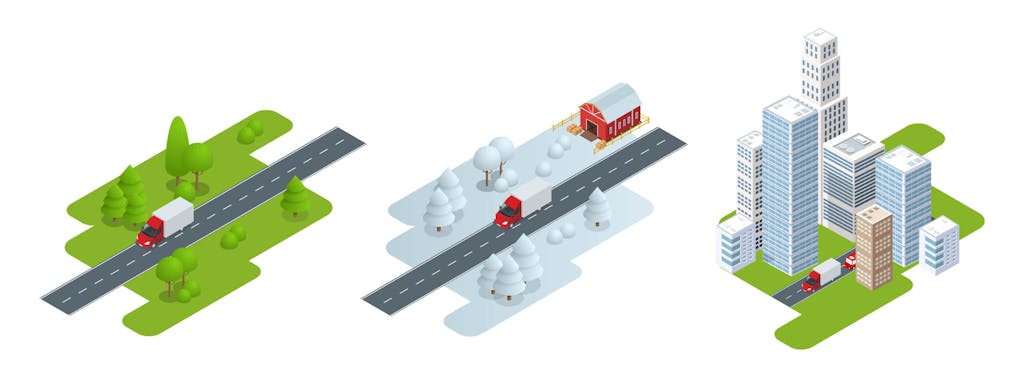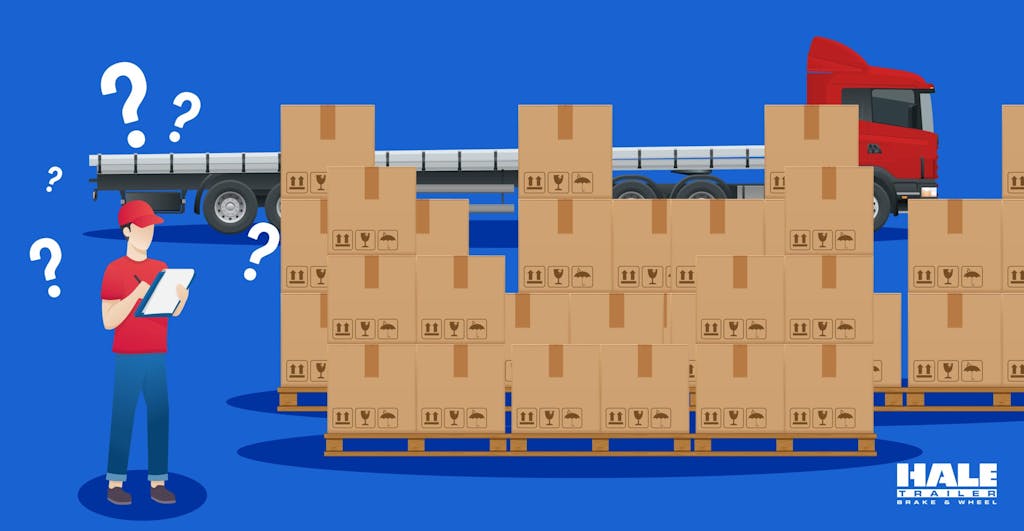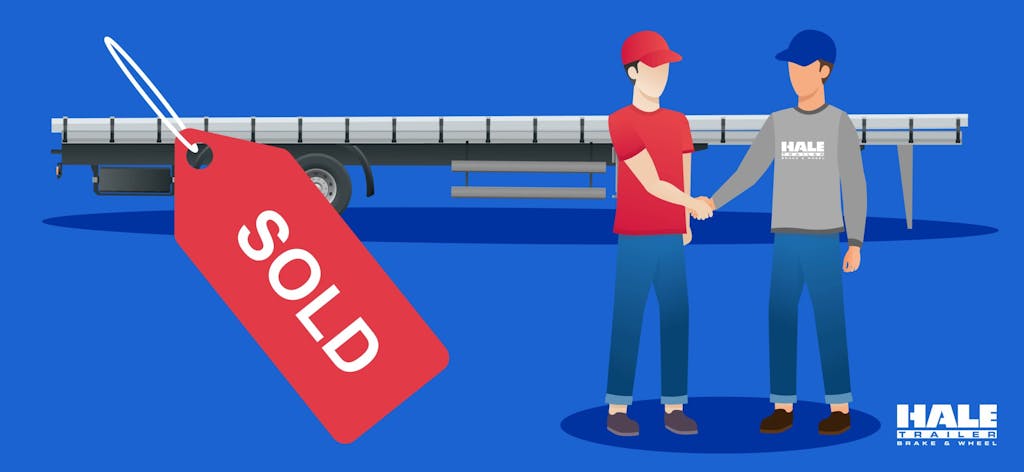8 Tips When Buying a Used Semi-Trailer
August 25th, 2020
With 72.5 percent of all freight in the US being transported by semi-trucks and trailers in 2019, the value and importance of having a good semi-trailer can’t be understated. If you are an owner/operator or manage a fleet you need to have the right equipment for the job.
Perhaps you’re ready to upgrade your older trailer or need a cost-effective option to build up your fleet. You can always purchase a new trailer, but that can be a hefty investment. You can also rent a trailer, but if you need it for a longer period of time, it may make more sense to purchase.
Thankfully, you don’t always have to buy new. Looking for a used trailer for sale is a great way to get what you need from a trailer without taking on the cost of a brand new rig.
Of course, anytime you’re searching for a used trailer, you want to be extra cautious about what you’re purchasing. It’s important to make sure that the trailer is up to date on inspections, free of damage or major incidents, and has all the features your drivers need to get the job done.
To get you started, we’ve compiled a list of the top 8 things to consider when looking to purchase a used semi-trailer. From knowing your exact needs, to finding a great trailer dealer, you’ll have all the advice you need to make a well-informed purchase!
1. Determine your used semi-trailer needs
Assessing your needs is probably the first step to choosing a trailer. Depending on the freight you’re shipping, there are so many options to choose from, including everything from used reefer trailers to hopper bottom trailers, and many others in between.
Here are a few questions to ask as you consider your next used semi-trailer purchase:
- What type of freight are you hauling?
- Do you haul heavy and/or over-sized equipment?
- Do you need a temperature-controlled trailer?
- Will you haul aggregate?
- Do you need to carry fluids like dairy or oil?
- Are you moving building materials like lumber?
- Do you only haul dry goods?
If you know exactly what you’ll be transporting, it’s far simpler to narrow down your options. For example, if you know that you transport perishable items like meat, produce, or pharmaceuticals, you can rule out looking for a used dry van trailer for sale and focus on a used reefer trailer for sale.
2. What geographical regions do you travel through?
Do you transport freight through the entire country, or are you focused on a specific region? If you need a used semi-trailer that can travel far and adhere to multiple local and state regulations, you’ll have to factor that into your search for a trailer that meets size and weight requirements.
You also want to think about the types of roads you’ll be driving. Some trailers are built for rougher terrain, while some are better for smooth highways. Here is a more detailed breakdown of things to consider:
What type of road?

Highways, 2-lane roads, rough terrain, cities, mountains, or damaged roads are just some of the roadways you may encounter. Semi-trailers are made to perform better in certain environments, which can help make hauls safer and more efficient.
Do you encounter inclement weather?
Rain, snow, heat, cold, and other adverse conditions can affect your choice of used semi-trailer. If your fleet is hauling through extreme weather conditions regularly, you’ll want to buy a trailer that’s well-suited for those conditions.
Are you traveling far?
Are you hauling locally or across the country? There may be compliance issues to consider, in addition to trailer technology that helps with gas mileage and efficiency, especially if you’re traveling longer distances.
What local or state regulations are there?
If you’re moving across state lines, you’ll likely encounter different laws that govern the size and weight for your used semi-trailer. This is especially important if you’re looking to purchase a used lowboy trailer or other heavy-hail trailer. Check the different regions and know where you may need additional permitting to help you make the best trailer choice.
3. Know your budget
Your budget. This is probably one of the more important factors in choosing a used semi-trailer. Obviously, certain types of trailers will be more expensive based on their size and function. But you also want to think about how the trailer is constructed.
Aluminum trailers often have a higher up-front cost but are durable and typically require less upkeep. Steel trailers can be sturdier, which may be helpful in rough terrain, but can cost more in maintenance. Read more about the differences between aluminum and steel trailers.
Some other considerations are:
- What will your monthly payment be?
- What are general maintenance costs for the type of used semi-trailer you’re purchasing?
- How do insurance costs differ?
- What are the fuel costs?
- Is there potential for asset growth if you sell the trailer later?
- Is investing in a trailer better than renting?
Expect certain types of semi-trailers to be more expensive simply because of their function. For example, a used moving floor trailer will likely be more expensive than a basic used dry van. Moving floor trailers have hydraulic functions and the ability to carry heavier freight, making it a more costly trailer.
You may need to invest in something like a moving floor trailer because it meets your specific needs–just make sure it has the necessary features and is in optimal condition before making a purchase.
4. What technology does the trailer need to have?
Trucks and semi-trailers can get pretty fancy these days. Features like GPS capabilities, sensors, and digital business automation can be found on trailers. And the technology continues to advance.
When choosing a used semi-trailer, consider whether or not these types of features are necessary. In some cases, they may not be needed, but may help streamline business operations, making them a worthwhile investment.
5. Consider how long you plan to use the trailer
If you’ve thought about renting vs. buying a used semi-trailer, evaluate how long you plan to use the trailer and how often. If the trailer is needed sporadically, purchasing may not be the best option.
Additionally, consider the long-term investment of the trailer. Will you be able to use it for years to come, or will your needs change in the short-term? If you plan to use the trailer for many years, purchasing is likely your best option.
6. Trailer Weight and Length

A couple of the first questions you may ask when looking for a used semi-trailer will do with the trailer’s capacity. For example, you may ask if a used flatbed trailer for sale is 48 feet or 53 feet long. While 48 feet is standard, you may need a longer trailer to accommodate the type of freight you haul. You also want to know the semitrailer length laws to prevent any surprises when hauling.
Other factors that may affect the weight are type of flooring and trailer construction. Aluminum is lighter, which may be a good option if you need to adhere to specific weight regulations. But steel may feel like a studier option.
If you don’t typically haul full loads, you may consider getting a lighter trailer. Yet, if you haul heavier loads, or do LTL shipping, you want to make sure that you have a trailer that’s agile and can accommodate different types of freight.
7. Do a Thorough Inspection
Let’s say you found a used dump trailer for sale and you’re considering a purchase. Before you do, make sure you do a thorough inspection. Semi-trailers are a huge investment and you want to make sure the one you’re buying is going to give you longevity. Here are a few things to check for:
- Rust
- Body damage
- Leaks
- Electrical
- Tires
- Suspension
- Interior (floor, walls, vents, doors)
- Brakes
- Underneath trailer
8. Choose a Reputable Trailer Dealer

At the end of the day, choosing the best used semi-trailer requires a reputable dealer. Working with a knowledgeable representative will help you understand the differences between semi-trailer types and their features, and make sure your trailer investment aligns with your needs.
A good dealer may also be able to provide more accurate information on the trailer’s history, offering a higher level of credibility. Make sure to research the dealer, and other information about the trailer manufacturer to ensure that you’re getting the best trailer.
Hale Trailer is Your Source for Used Semi-Trailers
When you’re ready to invest in a used tractor trailer, dry van, lowboy, reefer, or any other type of semi-trailer, Hale Trailer is your source for information and inventory selection. We carry a wide variety of well-known manufacturers to serve any application and are ready to help serve you at any of our 12 trailer sales locations in the U.S.
On top of offering new and used semi-trailers for sale, Hale has an experienced service department that can help you get the repairs and maintenance you need to keep your trailers running in tip-top shape. Contact us today to find out how we can help you get the best semi-trailer for your needs!
All the information on this website – https://www.haletrailer.com – is published in good faith and for general information purposes only. Hale Trailer Brake and Wheel does not make any warranties about the completeness, reliability and accuracy of this information. Any action you take upon the information you find on this website, is strictly at your own risk. Hale Trailer Brake and Wheel will not be liable for any losses and/or damages in connection with the use of our website.
